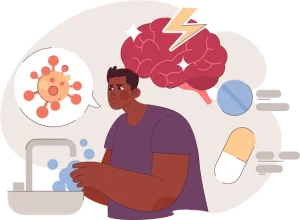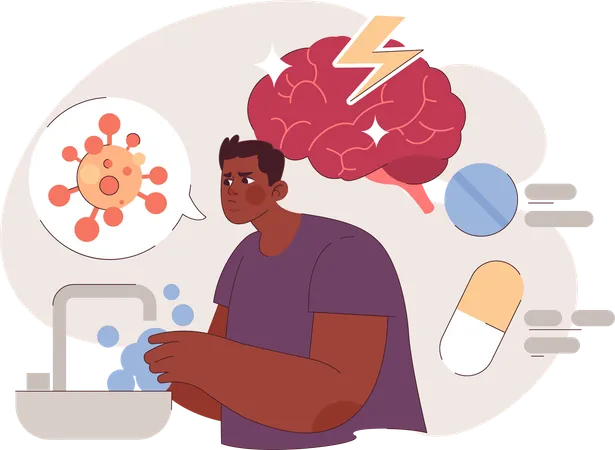Introduction:
Obsessive-Compulsive Disorder (OCD) is a complex mental health condition that affects millions of people worldwide. For those wondering how to cure OCD or at least manage its symptoms effectively, there are various non-medical strategies that can make a meaningful difference. Although there is no absolute cure, managing OCD symptoms can allow individuals to lead fulfilling and balanced lives. Here, we explore seven practical methods to support individuals on their journey to manage OCD without medication.
Understanding OCD and Its Impact
Living with OCD can feel overwhelming, with individuals often caught in a cycle of intrusive thoughts and compulsive actions. These symptoms can interfere with work, relationships, and overall well-being. However, with the right strategies and support, many people with OCD learn to manage their symptoms effectively and regain control of their lives.
For those seeking the best OCD treatment, consider visiting:

1. Cognitive Behavioral Therapy (CBT) as a Key Method for How to Cure OCD
One of the most effective therapies for how to cure OCD is Cognitive Behavioral Therapy (CBT). This form of therapy helps individuals identify and challenge the intrusive thoughts that drive their compulsions. CBT uses techniques like Exposure and Response Prevention (ERP), which gradually exposes individuals to OCD triggers and helps them resist compulsive behaviors.
For those seeking more information on how to cure OCD with CBT, you can refer to trusted resources like the National Institute of Mental Health (NIMH), which provides detailed information on evidence-based approaches to managing OCD.
2. Practicing Mindfulness and Meditation for Managing OCD
Mindfulness is another powerful strategy for those looking to manage their OCD symptoms. Learning how to cure OCD involves building awareness of your thoughts and feelings without letting them control your actions. Mindfulness and meditation techniques—such as deep breathing and progressive muscle relaxation—can help individuals stay grounded and prevent obsessive thinking from spiraling into compulsive actions.
Although mindfulness won’t completely eliminate OCD symptoms, it can make triggers less overwhelming and help individuals develop healthier coping mechanisms.
3. Building a Strong Support System for Managing OCD
A critical element in how to cure OCD is having a support system. Family, friends, and support groups can provide invaluable emotional support and advice for managing OCD symptoms. Sharing experiences with others who understand the struggles of OCD can offer new perspectives and encouragement.
The International OCD Foundation (IOCDF) is an excellent resource for individuals looking to connect with others and find support in managing their condition.
4. Adopting a Healthy Lifestyle to Combat OCD Symptoms
An essential part of how to cure OCD naturally involves making lifestyle changes that promote overall well-being. Regular physical exercise, a balanced diet, and quality sleep all play crucial roles in reducing stress, improving emotional health, and mitigating OCD symptoms. Exercise, in particular, has been shown to reduce anxiety levels, while sufficient sleep can improve emotional stability and mental clarity.
Incorporating a healthy lifestyle, along with a consistent daily routine, can provide much-needed structure for individuals with OCD.
5. Identifying and Managing Stress Triggers to Improve OCD Symptoms
Stress is a major exacerbating factor for OCD. To learn how to cure OCD, individuals must focus on reducing stressors that can trigger compulsive behaviors. Techniques such as journaling, spending time in nature, and engaging in hobbies can help lower stress levels and provide a mental break from OCD-related anxiety.
Allocating time each day for self-care and relaxation can also reduce the impact of stress on OCD symptoms, making it easier to cope with triggers.
6. Positive Reinforcement and Goal Setting in Managing OCD
Positive reinforcement is an important tool for managing OCD. It focuses on rewarding small achievements to encourage positive behavior changes. Learning how to cure OCD also means celebrating progress, whether it’s resisting a compulsion or successfully practicing a new coping technique.
Setting achievable goals allows individuals to monitor their progress and boost motivation. This positive feedback loop encourages continued effort in managing OCD symptoms.
7. Seeking Professional Help for OCD Treatment
While the above strategies can be helpful, some individuals may require additional support from mental health professionals. Psychologists, therapists, and psychiatrists trained in OCD treatment can provide specialized guidance and customized strategies to address the unique challenges of each individual.
For more information on how to cure OCD and to find licensed professionals in your area, consider visiting the Centers for Disease Control and Prevention (CDC) for mental health resources.
Conclusion
Managing OCD symptoms is an ongoing journey that requires dedication, patience, and the right support. While there may be no definitive cure for OCD, these strategies can significantly reduce the impact of symptoms, allowing individuals to lead more fulfilling lives. Remember that reaching out for professional help is also a sign of strength. With consistent effort and the right strategies, managing OCD can become a reality for those who seek relief.

